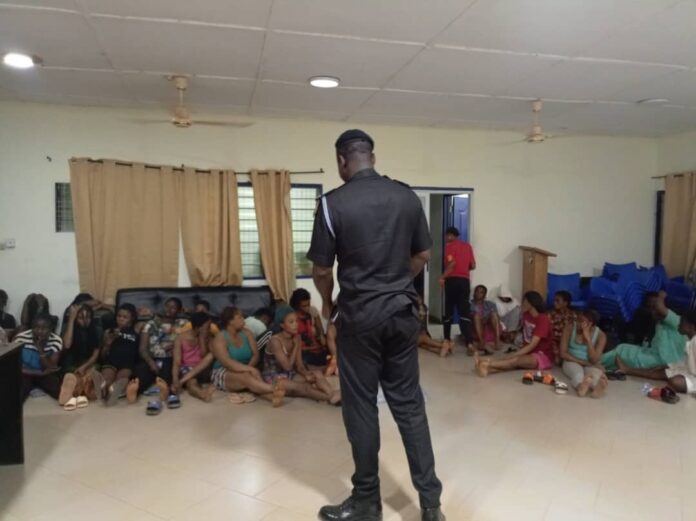Police arrest 32 Nigerian women and 10 Ghanaian men for pr0stitution, drug offences (video)
In a sweeping operation that has rocked the quiet town of Ayamfuri in Ghana’s Central Region, the Central North Regional Police Command has arrested a total of 42 individuals, including 32 Nigerian women and 10 Ghanaian men, for alleged involvement in prostitution and drug-related offences.
The raid, which took place on Wednesday, April 16, 2025, was carried out as part of an ongoing intelligence-led crackdown on illicit activities believed to be fueling insecurity and moral decay in the region. The arrests have ignited conversations on human trafficking, drug peddling, illegal migration, and the socio-economic dynamics that drive vulnerable individuals into crime and exploitation.
YOU MAY READ
Court dismisses Abuja s3x workers suit against Wike, says pr0stitution illegal
The police operation was executed in the early hours of the morning, targeting known hotspots and informal settlements suspected to house commercial sex workers and drug dealers. Acting on weeks of surveillance and community reports, officers swept through various hideouts, apprehending individuals caught in the act and others who attempted to flee the scene.
DCOP Abraham Acqaye, the Central North Regional Police Commander, described the operation as “a decisive strike against a growing network of crime,” stressing that the police acted based on concrete intelligence linking several suspects to organized rings operating under the guise of nightlife and hospitality businesses.
The commander added that the suspects ranged in age from 20 to 32 and were caught with incriminating items including:
Of the 42 arrested, 32 are Nigerian women, many of whom claimed to have been trafficked into Ghana under false pretenses. The remaining 10 suspects are Ghanaian men, believed to be operating as drug peddlers and possibly as enforcers or facilitators within the criminal network.
Some of the Nigerian women, during preliminary interviews with the police, revealed harrowing stories of deceit and coercion. According to one 24-year-old woman, she was promised a job as a hairdresser in Accra but was taken to Ayamfuri and handed over to a “madam” who forced her into sex work to repay an imaginary debt of $2,000.
YOU MAY READ
The Truth About Skimpy Dress Codes in the Hospitality Industry: A Recipe for Disaster or a Smart Business Move
Others said they were lured from Nigeria with the promise of working as domestic helpers or waitresses, only to have their travel documents seized and their movements restricted upon arrival.
“These women are not just criminals – many are victims of a well-organized human trafficking syndicate,” a senior police officer, who spoke on condition of anonymity, told this reporter. “However, the law requires that all be processed, investigated, and prosecuted where necessary.”
The arrest has shed light on the shadowy underworld of Ayamfuri, a border town that has increasingly become a haven for underground activities due to its strategic location and poor regulatory oversight. Reports from local residents allege that some lodges, pubs, and guest houses have been converted into brothels, with young women openly soliciting customers.
Residents also accused certain landlords of colluding with criminal elements to sublet rooms for illicit business in exchange for higher rent. Some of the buildings raided by police had been partitioned with curtains, hosting up to five women in a single room.
Eyewitnesses described the living conditions as squalid, with poor ventilation, lack of running water, and shared toilets crawling with filth. Despite the dangers, many women reportedly remained due to fear of reprisal from their traffickers.
YOU MAY READ
Police uncover hotel where children are used as sex slaves in Anambra (photos)
While much of the attention has been focused on the prostitution element of the case, police say the drug component is equally alarming. The 10 Ghanaian men arrested are believed to be mid-level distributors working for a broader syndicate that supplies cannabis and synthetic drugs to Ayamfuri and surrounding towns.
The drug trade, according to police intelligence, has been fueling other crimes including robbery, sexual violence, and cultism. The involvement of hard drugs like cocaine and tramadol is also being investigated, with samples sent to a forensic laboratory in Accra for analysis.
“These substances are being sold not just to sex workers but also to teenagers and young adults who frequent nightspots. We are looking at the possibility of cross-border trafficking as well,” said DCOP Acqaye.
Human rights organizations monitoring the arrests have called for a nuanced approach to the case, insisting that some of the suspects may be victims rather than willing participants. Representatives from the Ghana Anti-Human Trafficking Coalition visited the police station on Thursday, April 17, to speak with the Nigerian women.
These accounts are being documented by investigators, who are now working closely with the Nigerian High Commission in Accra to verify the identities and nationalities of the women and possibly arrange repatriation for those found to be victims.
According to the International Organization for Migration (IOM), Ayamfuri is not the only Ghanaian town witnessing this trend. In recent years, there has been an uptick in the number of Nigerian women trafficked to Ghana, Togo, and Ivory Coast for commercial sex work. Many fall victim due to poverty, lack of education, or domestic abuse back home.
YOU MAY READ
Nigerian Hairdresser Sentenced to 5 Years in Ghana for Trafficking Young Women and Forcing Them into Prostitution
The local community in Ayamfuri has expressed mixed feelings about the arrests. While many residents praised the police for acting decisively, others voiced concerns that the operation might be a one-off event rather than part of a sustained strategy.
Madam Efua Owusu, a market trader, told this reporter, “We thank the police, but what next? If they don’t come back again, the criminals will return. They always do.”
There were also criticisms from some quarters that the operation did not address the root causes of the issue – including unemployment, weak border control, and lack of local policing. Youth groups in Ayamfuri are now calling for job creation initiatives and rehabilitation programs for young women rescued from the sex trade.
All 42 suspects are currently being held in police custody at a secure location in the Central Region. They are expected to be arraigned before a magistrate court next week to face preliminary charges. The women are likely to be charged with soliciting for sex and illegal residency, while the men could face charges of drug trafficking and illegal possession of narcotics.
However, police have stressed that prosecution will be based on the outcome of their ongoing investigations. Victims of human trafficking, once verified, may be placed under protective custody and offered rehabilitation instead of prosecution.
The Attorney General’s Department has also dispatched legal officers to advise on the classification of the suspects and to determine who may be eligible for plea bargains, bail, or repatriation.
The arrests have once again highlighted the delicate issue of cross-border migration and crime between Ghana and Nigeria. While both countries share long-standing ties, the frequent involvement of Nigerians in prostitution-related arrests in Ghana has become a political and diplomatic challenge.
Ghanaian civil society groups have in the past accused West African immigration loopholes of allowing traffickers to move women with little to no oversight. The Ghana Immigration Service has now promised to increase screening efforts at border posts and collaborate more closely with Nigerian authorities.
The Nigerian High Commission in Ghana issued a brief statement acknowledging the arrests and promising full cooperation with Ghanaian authorities to ensure that justice is served – both for victims and offenders.
At the heart of this situation lies a deeper issue – the moral and economic crisis facing many young people in West Africa. For every woman who ends up trafficked to a foreign country, there is a system that failed her – failed to educate her, protect her, empower her.
According to the UNDP Human Development Index, youth unemployment in Nigeria is over 40%. With such a grim reality, it is not surprising that many young women are easily deceived with promises of a better life abroad.
It is also no coincidence that many of the traffickers are fellow citizens – women who once walked the same painful road, but now become agents of despair.
Experts agree that tackling this problem will require a multifaceted approach:
- Rehabilitation Centers: Ghanaian authorities must invest in shelters and rehabilitation programs for women rescued from trafficking. These centers must offer psychological counseling, vocational training, and reintegration support.
- Tougher Immigration Laws: A regional taskforce must be established to monitor and disrupt trafficking routes across the ECOWAS sub-region.
- Public Awareness Campaigns: Both in Nigeria and Ghana, there must be sustained campaigns educating young women about the dangers of irregular migration and fake job offers.
- Community Policing: Local residents must be empowered to report suspicious activities without fear of reprisal.
- Youth Empowerment Programs: Governments must prioritize job creation, education, and skill acquisition programs to address the root causes of poverty and desperation.
The arrests in Ayamfuri serve as a grim reminder that behind every raid, behind every headline, are real people – victims and perpetrators – shaped by a system of neglect, poverty, and moral failure. It is not enough to arrest and detain. We must investigate, rehabilitate, educate, and reform.
If West African nations hope to curb the scourge of trafficking, drugs, and exploitation, they must work together – across borders, across sectors, and across ideologies. Because until then, stories like Ayamfuri will remain all too common.





